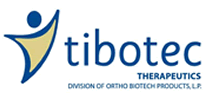Tibotec
Starts Global Phase 3 Clinical Trials Studying TMC435 in Adults
with Chronic Genotype 1 HCV
--
Phase 3 program for once-daily TMC435
includes treatment-naïve population and patients who
have relapsed after prior interferon-based treatment
 Cork,
Ireland -- February 18, 2011 -- Tibotec Pharmaceuticals announced
today that two global, registrational Phase 3 trials are recruiting
patients to examine TMC435, its investigational hepatitis
C protease inhibitor, in treatment-naive adults with chronic
genotype 1 hepatitis C virus (HCV). A third global phase 3
trial is being conducted in genotype 1 HCV patients who have
experienced a viral relapse after prior interferon-based treatment. Cork,
Ireland -- February 18, 2011 -- Tibotec Pharmaceuticals announced
today that two global, registrational Phase 3 trials are recruiting
patients to examine TMC435, its investigational hepatitis
C protease inhibitor, in treatment-naive adults with chronic
genotype 1 hepatitis C virus (HCV). A third global phase 3
trial is being conducted in genotype 1 HCV patients who have
experienced a viral relapse after prior interferon-based treatment.
Approximately 3.2 million people in the U.S. live with chronic
hepatitis C disease and more than 170 million people have the
disease globally. The response-guided trials will compare the
efficacy, safety and tolerability of TMC435 given as a single
150 mg oral tablet once daily for 12 weeks versus placebo; each
patient also will be treated with a background regimen of peginterferon
and ribavirin for 24 or 48 weeks.
"TMC435 is an important component of our growing HCV pipeline,"
said Brian Woodfall MD, Vice President of Global Clinical Development
at Tibotec. "The initiation of the TMC435 Phase 3 clinical
trial program reinforces our commitment to develop innovative
new treatment options that may decrease the duration of treatment
for patients with chronic hepatitis C infection."
The first global, Phase 3, double-blind, randomized study, known
as TMC435-C208 or QUEST-1 (QD
dosing of TMC435 of previoUsly
untreated GEnotype 1 patienTs-1),
will evaluate a single TMC435 once-daily oral tablet (150 mg)
versus placebo in treatment-naive HCV patients. Both groups
will also receive peginterferon
alfa-2a (Pegasys) and ribavirin (Copegus) as part of their
treatment.
The
second global, Phase 3, double-blind, randomized study, known
as TMC435-C216 or QUEST-2 (QD
dosing of TMC435 of previoUsly
untreated GEnotype 1 patienTs-2),
also will evaluate a single TMC435 once-daily oral tablet (150
mg) versus placebo in treatment-naive HCV patients. However,
patients in this trial will either receive peginterferon alfa-2a
(Pegasys) and ribavirin (Copegus) or peginterferon alfa-2b (PegIntron)
and ribavirin (Rebetol) as part of their treatment.
A third global, Phase 3, double-blind randomized study, known
as TMC435-C3007 or PROMISE (PROtease
inhibitor TMC435 In
PatientS who have previously
rElapsed on IFN/RBV), will
evaluate a single TMC435 once-daily oral tablet (150 mg) verses
placebo in HCV patients who experienced viral relapse after
previous interferon-based therapy. Both groups will receive
peginterferon alfa-2a (Pegasys) and ribavirin (Copegus). The
complete treatment duration for all three trials will be 24
or 48 weeks, depending on patient response.
The studies will be conducted at more than 160 sites in 24 countries,
including the U.S. and countries throughout Europe, and together
seek to enroll approximately 1,125 HCV genotype 1 infected patients
who are treatment-naive or have experienced a relapse after
previous interferon-based HCV therapy.
To be eligible, patients must have chronic hepatitis C infection,
and must have had a liver biopsy within three years of the screening
visit. For those patients who have not had a liver biopsy in
the three years prior to the study, one will be performed before
the baseline visit. In addition, eligible patients need to have
completed a recent ultrasound with no findings suspicious of
hepatocellular carcinoma (HCC). Patients with signs of hepatic
decompensation, liver disease of any non-HCV etiology, co-infection
with hepatitis B or HIV-1 and 2 or a history of malignancy within
5 years of the screening visit are ineligible for the study.
Patients in QUEST-1 and QUEST-2 trials must not have received
any prior treatment for hepatitis C, and patients in the PROMISE
trial must have previously received at least 24 weeks of (peg)interferon-based
therapy, along with documented negative HCV RNA at last on-treatment
measurement, and have relapsed (detectable HCV RNA) within one
year of last taking medication.
The
primary endpoint of the studies is to assess whether TMC435
is superior to placebo in achieving sustained virologic response
(SVR), defined as HCV RNA < 25 IU/ml undetectable, 24 weeks
after the planned end of treatment (SVR 24), with the final
analysis being performed after the last patient reaches week
72 of the study. Secondary endpoints include superiority of
TMC435 versus placebo at 12 weeks (SVR 12), after planned end
of treatment and at week 72 of the study. Evaluations of viral
breakthroughs, relapse rates in treatment groups, safety and
tolerability also will be assessed.
Phase 3 studies for TMC435 also recently launched in Japan.
For additional information on inclusion and exclusion criteria
for these studies, please see www.clinicaltrials.gov
or email info@tibbe.jnj.com.
About Tibotec Pharmaceuticals
Tibotec
Pharmaceuticals is a global pharmaceutical and research development
company. The company's main research and development facilities
are in Beerse, Belgium with offices in Titusville, NJ, and Cork,
Ireland. Tibotec is dedicated to the discovery and development
of innovative HIV/AIDS and hepatitis C drugs, and anti-infectives
for diseases of high unmet medical need. Tibotec Pharmaceuticals
is a subsidiary of Johnson & Johnson. For more information
see www.tibotec.com.
2/25/11
Source
Tibotec Pharmaceuticals. Tibotec Starts Global Phase 3 Clinical
Trials Studying TMC435 in Adults with Chronic Genotype 1 HCV.
Press release. February 18, 2011.
|
| |
|
|
